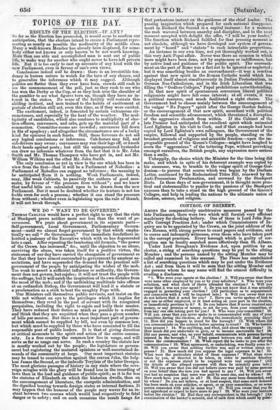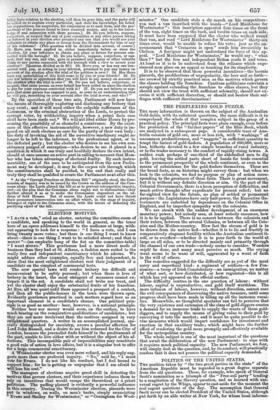CONTROL OF BRIBERY.
'AMONG the comparatively unobtrusive measures passed by the late Parliament, there were two which will furnish very efficient machinery for checking bribery. One of these is Lord John Rus- sell's Corrupt Practices Act ; under -which Commissioners of In- quiry are to be appointed by the Crown, on the joint address of the two Houses, with strong powers to exact papers and evidence, and to coerce and indemnify witnesses even those who have taken part in the corrupt practices. Every witnesses, which is guilty of cor- ruption oan be locally searched more effectively than St. Albans. Under Lord Brougham's Evidence Act, upon petition by an elector, a string of searching questions may be put to the sitting Member ; and the persons named by the sitting Member may be called and examined in like manner. The Times has contributed a list of searching questions which may be put under the Evidence Act ; and from them it will be seen that the sitting Member and the persons whom he may name will find the utmost difficulty in evading a disclosure. "1. Who were your agents at the election ? 2. Will you swear that there were none other employed by you or by your solicitors ? 3. Who were your solicitors, and what clerk of theirs attended the election ? 4. Will you swear that A was not your agent ? 5. Do you not know that A was actually engaged in promoting your election ? (All particulars as to acquaintance and connexion with A will be inquired into.) 6. Will you swear that you do not believe that A acted for you? 7. Have you never spoken of him to any one as either employed, or at least acting on your part in the election, or immediately previous to it ? 8. Do you believe that 11 never received any money, or any promise of money, to act for you, from your committee, or from any one else taking part for you ? 9. Who were your committee ? 10. Will you swear that you never spoke to or communicated with any of your committee during the election, or during the immediately preceding days ? 11. How did you happen to stand for the borough ? 12. With whom did you communicate on the subject before agreeing to stand ? 13. Who besides were present ? 14. Was anything, and what, said about the expenses? 15. How much did you undertake to give or to become answerable for ? 16. Did any person, and who, on your behalf, communicate with persons having interest in the borough ? 17. What passed between you and that person before the communication ? 18. What report did he make to you after the communication ? 19. What agreement, or undertaking, was finally come to ? 20. Will you swear that nothing further was said or written about ex- penses ? 21. How much did you suppose the legal expenses to be ? 22. What were the particulars stated of those expenses ? What steps were taken by you or directed to be taken, in order to ascertain whether or. not the expenses stated to be required were real expenses ?(All the details of the alleged expenses will then be minutely gone into.) 23. Will you swear that you did not believe more was paid by some persons on your behalf than the sum you had agreed to pay ? 24. Will you swear pu had no suspicion that more was paid by some one, and by whom ? 25. How much have you paid in all ? 26. Has any more been demanded, and by whom ? Do you not believe, or at least suspect, that some such demand has been made on your solicitor, or agent, or on your committee, or on some person connected with you in some way ? 27. Will you swear that you do not apprehend or expect to have more to pay ? 28. Who were your bankers before the election ? 29. Had they any correspondent in the borough ? [An examination of the banker's account, and of each item which could by possi- bility have relation to the election, 'will then be gone into, and the party will ha called on to explain every particular, and state his knowledge, his belief, his suppositions, his suspicions, his conjectures as to each item, and the pro- ceedings of the persons found to have received money, and as to his know- ledge of and connexion with those persons.] 30. Do you believe, suppose, conjecture, or suspect that any of your committee or any other person taking 1,n interest in your election ever promised any one that you would use your influence- to obtain any place or favour from the Government for him or any of his relations ? (This question will be divided into several, of course.) 31. Have you been applied to, either immediately before or since the election, for your influence to obtain any place or favour for persons con- nected with the borough? 32. Do you believe, suppose, conjecture, or sus- pect, that any one, and who, gave or promised any money or other valuable thing to any person connected with the borough with a view to secure your election ? (Question divided as in 30.) 33. Have you or has any one con- nected with you, or acting in your interest, promised pay any money on account of the election after the trial of the petition is over ? 34. Has there been any undertaking of this kind come to by you or your friends? 35. Do you not believe or apprehend that you will have to pay money on account of the election after the trial is over ? 36. Do you not believe, conjecture, or suspect, that some person on your behalf has been called on since the election to pay for your expenses connected with it ? 37. Do you not believe or sup- pose that some person has engaged to pay, or come to an understanding that he will pay, something on your account after the trial is over, and who ?"
By the operation of these two acts, Parliament will now have the means of thoroughly exploring and disclosing any bribery that may exist ; and it will need either the culpable sufferance of the Commons, or the criminal obstruction of the Lords, to protect the corrupt voter, by withholding inquiry when a prima facie case shall have been made out. We will not libel either House by pre- suming the possibility of so shameful a connivance. By the exist- ence of this effective instrumentality, however, a new duty is im- posed on all such electors as care for the purity of their own body : the duty of invoking the aid of the corrective machinery ought no longer to be left to the informer, to the professional agent, or to the defeated party ; but the elector who desires to see his own con- stituency purged of corruption—who desires to see it placed in a condition in which it can truly and healthily declare its own inteat, should at once assume an active part in calling to account that Mem- ber who has taken advantage of electoral frailty. By such instru- mentality, one of the uses to be anticipated from the new Parlia- ment may be developed ; it may be the corpus vile through which the constituencies shall be purified, to the end that really and truly they shall be qualified to create the Parliament next after this.
* As the" Corrupt Practices at Elections Bill" originally stood, the Com- mission of inquiry was to be issued by the Crown on the address of the Com- mons alone: the Lords altered the bill so as to prevent retrospective inquiry, and—on the plea that the Commons alone ought not to disfranchise—they further altered it so as to make the Commission dependent on the ad- dress of both Houses. But of course the Lords could not have thruit" their premature intervention into an affair which, in the stage of inquiry, belonged of right to the Commons alone, with the intent of defeating the purifying object of the bill.



























 Previous page
Previous page